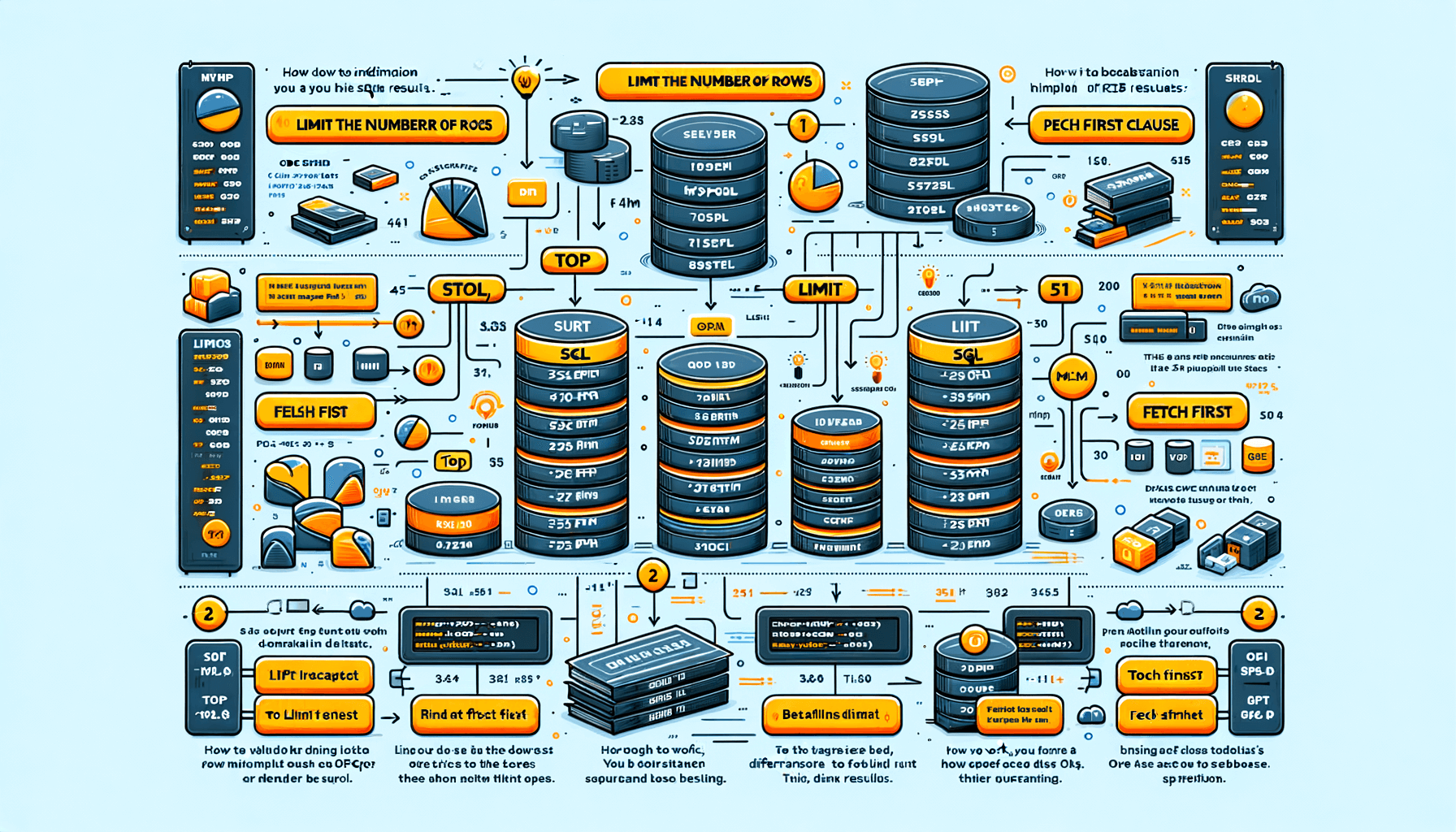A big variety of articles and resources

How to practice my SQL skills?
 Sia Author and Instructor
Learn SQL
Sia Author and Instructor
Learn SQL
12 minute read
Learning SQL can open many doors in the tech world. Whether you're a beginner or looking to polish your skills, practicing SQL is key. This guide will help you explore various methods to improve your SQL abilities, from understanding basic commands to working on real-world projects.
Key Takeaways
- Master the basics of SQL syntax and commands to build a strong foundation.
- Use online platforms to practice SQL in an interactive way.
- Participate in challenges and competitions to test your skills.
- Work on real-world projects to apply SQL in practical scenarios.
- Engage with communities and forums to learn from others and share knowledge.
Understanding SQL Syntax and Commands
Basic SQL Commands
To start with SQL, we need to understand the basic commands. These include SELECT, INSERT, UPDATE, and DELETE. Mastering these commands is essential for any SQL user. They form the foundation of database interactions.
Advanced SQL Commands
Once we are comfortable with the basics, we can move on to more advanced commands like JOIN, UNION, and SUBQUERY. These commands allow us to perform more complex queries and data manipulations. Advanced commands help in optimizing and managing large datasets efficiently.
Best Practices for Writing SQL
Writing SQL isn't just about knowing the commands. It's also about following best practices to ensure our queries are efficient and easy to understand. This includes using proper formatting, commenting our code, and avoiding unnecessary complexity. By adhering to these practices, we can write SQL that is both powerful and maintainable.
Understanding and practicing these commands and best practices will significantly enhance our SQL skills and prepare us for more complex database tasks.
Utilizing Online SQL Practice Platforms
Online SQL practice platforms are a great way to improve our SQL skills. These platforms offer a variety of features that make learning interactive and engaging. Choosing the right platform can significantly impact our learning experience.
Engaging in SQL Challenges and Competitions
Participating in SQL challenges is a great way to test and improve our skills. These challenges often simulate real-world problems, making them an excellent practice ground. Competitions can be intense, but they push us to think critically and solve problems efficiently. Engaging in these activities not only sharpens our SQL abilities but also boosts our confidence.
Types of SQL Challenges
SQL challenges come in various forms, from simple query tasks to complex problem-solving scenarios. Some platforms offer timed challenges, while others focus on specific SQL functions or commands. These challenges help us understand different aspects of SQL and how to apply them in various situations.
Benefits of Participating in Competitions
Participating in SQL competitions offers numerous benefits. It enhances our problem-solving skills, exposes us to new techniques, and provides a platform to showcase our abilities. Additionally, it can be a fun and rewarding experience, especially when we see our progress over time.
How to Prepare for SQL Competitions
Preparation is key to success in SQL competitions. We should start by practicing regularly on platforms like sqlskillz.com, which offers a variety of challenges and real-world projects. It's also helpful to review SQL basics and advanced topics to ensure a well-rounded understanding. Joining study groups or forums can provide additional support and resources.
Engaging in SQL challenges and competitions is not just about winning; it's about learning and growing as SQL practitioners.
Working on Real-World SQL Projects
When it comes to mastering SQL, working on real-world projects is invaluable. We should start by identifying projects that align with our interests and career goals. This could be anything from creating a database for a small business to developing a complex data warehouse. Choosing the right project will keep us motivated and provide practical experience.
Collaboration is key in any professional setting. By working with teams, we can gain insights from others and improve our SQL skills. Team projects often involve different aspects of SQL, such as database design, query optimization, and data analysis. This collaborative approach not only enhances our technical skills but also prepares us for real-world scenarios.
Applying SQL in professional scenarios helps us understand its practical applications. We can start by integrating SQL into our current job roles or by taking on freelance projects. This hands-on experience is crucial for mastering MySQL performance and query optimization. It allows us to gain practical SQL skills for real-world applications with expert-led training and hands-on projects. An instructor with 25+ years experience in SQL and database management can provide valuable guidance and insights.
Working on real-world SQL projects bridges the gap between theoretical knowledge and practical application, making us more proficient and confident in our SQL abilities.
Exploring Advanced SQL Topics
Diving into advanced SQL topics can significantly enhance our database management skills. Mastering subqueries and joins allows us to handle complex queries efficiently. Subqueries, or nested queries, enable us to perform operations in steps, making our SQL code more modular and easier to debug. Joins, on the other hand, are essential for combining data from multiple tables, which is crucial for comprehensive data analysis.
Window functions are another powerful feature in SQL. They allow us to perform calculations across a set of table rows related to the current row. This is particularly useful for running totals, moving averages, and ranking data. By understanding and utilizing window functions, we can write more efficient and readable queries.
Performance optimization techniques are vital for ensuring our SQL queries run efficiently, especially as the size of our databases grows. Techniques such as indexing, query rewriting, and understanding execution plans can drastically reduce query execution time. It's important to regularly review and optimize our queries to maintain optimal database performance.
By mastering these advanced SQL topics, we can significantly improve our ability to manage and analyze data, making us more effective in our roles.
Learning from SQL Tutorials and Courses
Free vs. Paid Courses
When deciding between free and paid SQL courses, it's important to consider your learning goals and budget. Free courses are great for beginners who want to master the basics of SQL without any financial commitment. For instance, platforms like sqlskillz.com offer free learning with no credit card required. On the other hand, paid courses often provide more comprehensive content, personalized support, and sometimes even certifications that can boost your resume.
Recommended SQL Tutorials
There are numerous SQL tutorials available online, each catering to different skill levels. Websites like Udemy.com and Codecademy.com offer structured courses that guide you through SQL concepts step-by-step. These platforms often include hands-on projects and quizzes to reinforce learning. Additionally, many tutorials are designed to be self-paced, allowing you to learn at your own speed.
Maximizing Learning from Courses
To get the most out of your SQL courses, it's crucial to engage actively with the material. Take notes, participate in discussions, and complete all exercises. Applying what you've learned in real-world scenarios can also be incredibly beneficial. For example, try to replicate the exercises using your own datasets or collaborate with peers to solve complex problems. This approach not only solidifies your understanding but also prepares you for professional applications of SQL.
Engaging with SQL tutorials and courses can significantly enhance your skills, making you a valuable asset in any data-driven role. Whether you choose free or paid options, the key is to stay committed and practice regularly.
Practicing SQL with Sample Databases
Setting Up Sample Databases
To practice SQL effectively, we need to set up sample databases. These databases provide a controlled environment where we can experiment with different queries and commands. Setting up a sample database is straightforward and can be done using various tools like MySQL, PostgreSQL, or SQLite. Mastering the basics of SQL in a sample database helps us understand how real databases function.
Common Sample Databases to Use
There are several popular sample databases that we can use to hone our SQL skills. Some of the most commonly used ones include:
- Sakila: A database designed for a DVD rental store, perfect for practicing complex queries.
- Chinook: A digital media store database, great for learning about joins and subqueries.
- Northwind: A classic database for a trading company, ideal for beginners.
These databases come with predefined schemas and data, allowing us to focus on writing and optimizing queries.
Exercises to Practice with Sample Databases
Practicing with sample databases involves running various exercises to test our understanding. Here are some exercises we can try:
- Basic Queries: Retrieve data from single tables to get comfortable with SELECT statements.
- Joins: Combine data from multiple tables to understand relationships between datasets.
- Subqueries: Use nested queries to perform more complex data retrieval.
- Data Manipulation: Practice INSERT, UPDATE, and DELETE commands to manage data.
By regularly working on these exercises, we can build a strong foundation in SQL and prepare ourselves for real-world applications.
Practicing with sample databases is a crucial step in mastering SQL. It allows us to apply theoretical knowledge in a practical setting, making us more confident and proficient in handling real databases.
Participating in SQL Forums and Communities
Finding Active SQL Communities
To improve our SQL skills, joining active SQL communities is essential. These communities are filled with experienced professionals and beginners alike, providing a rich environment for learning and sharing knowledge. We can find these communities on platforms like Stack Overflow, Reddit, and specialized SQL forums.
Benefits of Community Engagement
Engaging with SQL communities offers numerous benefits. One key advantage is the opportunity to solve real-world problems by discussing them with others. Additionally, we can stay updated with the latest trends and best practices in SQL. This engagement also helps in building a professional network, which can be valuable for career growth.
Contributing to Discussions and Projects
Active participation in discussions and projects within these communities can significantly enhance our learning experience. By contributing, we not only help others but also reinforce our own understanding of SQL concepts. Sharing our knowledge and solutions can lead to recognition and respect within the community, further motivating us to continue learning and growing.
Reading SQL Books and Publications
Top SQL Books for Beginners
For those new to SQL, starting with the right books can make a huge difference. **
Using SQL in Data Analysis and Reporting
When we use SQL for data analysis, we can extract meaningful insights from large datasets. This helps us make informed decisions based on data trends and patterns. Mastering SQL queries is essential for anyone looking to improve their data analysis skills.
Creating reports with SQL involves writing queries that summarize and present data in a clear and concise manner. We can use various SQL functions to aggregate data, such as SUM, AVG, and COUNT. These functions help us generate reports that are easy to understand and interpret.
Integrating SQL with Business Intelligence (BI) tools allows us to visualize data and create interactive dashboards. This integration enhances our ability to analyze data and share insights with others. By combining SQL with BI tools, we can create powerful data-driven reports that support decision-making processes.
Exploring SQL Integration with Other Technologies
Integrating SQL with big data technologies allows us to handle vast amounts of information efficiently. SQL's compatibility with tools like Hadoop and Spark makes it easier to query and analyze large datasets. This integration is crucial for businesses that need to process and gain insights from massive data volumes.
In web development, SQL is often used to manage and retrieve data from databases. By combining SQL with languages like PHP, Python, or JavaScript, we can create dynamic and interactive web applications. This integration is essential for building robust and scalable web solutions.
SQL's role in cloud computing is significant as it helps manage databases hosted on cloud platforms like AWS, Azure, and Google Cloud. Using SQL in the cloud provides scalability, flexibility, and cost-efficiency, making it a preferred choice for modern enterprises. Cloud-based SQL databases also offer enhanced security and easier maintenance.
Discover how SQL can work with other technologies to make your projects more powerful. Our courses are designed to help you master these skills with ease. Visit our website to learn more and start your journey today!
Conclusion
Practicing SQL is a journey that can open many doors in the tech world. By mastering the basics and gradually tackling more complex queries, you can build a strong foundation. Remember, hands-on practice is key. Use real-world problems to test your skills and don't hesitate to seek help from online communities or courses. With dedication and the right resources, you'll become proficient in SQL and ready to take on data challenges in any professional setting.
Frequently Asked Questions
What is SQL?
SQL stands for Structured Query Language. It's a programming language used to manage and manipulate databases.
Why should I learn SQL?
Learning SQL is important because it's widely used in various fields like data analysis, web development, and database management. It helps you handle and analyze data efficiently.
What are some basic SQL commands I should know?
Some basic SQL commands include SELECT, INSERT, UPDATE, DELETE, and CREATE. These commands help you retrieve and modify data in a database.
Where can I practice SQL online for free?
You can practice SQL online for free on platforms like SQLZoo, W3Schools, and Mode Analytics. These sites offer interactive lessons and exercises.
What are SQL challenges and competitions?
SQL challenges and competitions are contests where participants solve SQL problems. Websites like LeetCode and HackerRank host these events to help improve your skills.
How can I use SQL in real-world projects?
You can use SQL in real-world projects by working on tasks like creating databases for small businesses, analyzing sales data, or managing customer information. Collaborating with a team can also provide practical experience.
Are there advanced topics in SQL I should learn?
Yes, advanced topics in SQL include subqueries, joins, window functions, and performance optimization techniques. Learning these can help you become more proficient in SQL.
What are some good resources for learning SQL?
Good resources for learning SQL include online tutorials, courses on platforms like Coursera and Udemy, and books like 'SQL for Dummies' and 'Learning SQL' by Alan Beaulieu.
Related Articles

How to limit rows in SQL results
11 minute read

How to select a percentage of rows in SQL
8 minute read

Understanding What a SQL Query Is and How It Works
9 minute read




